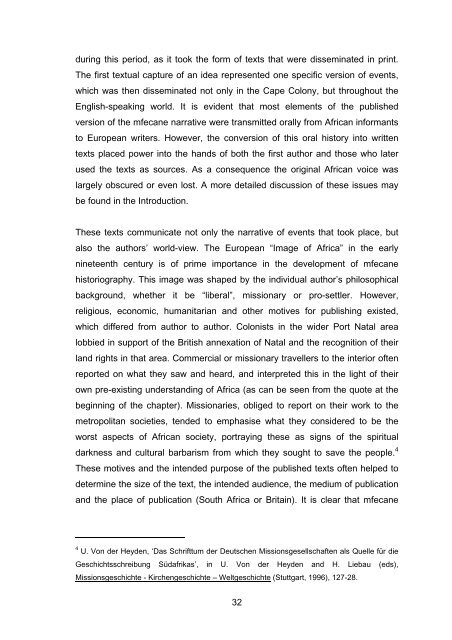The Historiographical Development of the Concept “mfecane” and ...
The Historiographical Development of the Concept “mfecane” and ...
The Historiographical Development of the Concept “mfecane” and ...
Create successful ePaper yourself
Turn your PDF publications into a flip-book with our unique Google optimized e-Paper software.
during this period, as it took <strong>the</strong> form <strong>of</strong> texts that were disseminated in print.<br />
<strong>The</strong> first textual capture <strong>of</strong> an idea represented one specific version <strong>of</strong> events,<br />
which was <strong>the</strong>n disseminated not only in <strong>the</strong> Cape Colony, but throughout <strong>the</strong><br />
English-speaking world. It is evident that most elements <strong>of</strong> <strong>the</strong> published<br />
version <strong>of</strong> <strong>the</strong> mfecane narrative were transmitted orally from African informants<br />
to European writers. However, <strong>the</strong> conversion <strong>of</strong> this oral history into written<br />
texts placed power into <strong>the</strong> h<strong>and</strong>s <strong>of</strong> both <strong>the</strong> first author <strong>and</strong> those who later<br />
used <strong>the</strong> texts as sources. As a consequence <strong>the</strong> original African voice was<br />
largely obscured or even lost. A more detailed discussion <strong>of</strong> <strong>the</strong>se issues may<br />
be found in <strong>the</strong> Introduction.<br />
<strong>The</strong>se texts communicate not only <strong>the</strong> narrative <strong>of</strong> events that took place, but<br />
also <strong>the</strong> authors’ world-view. <strong>The</strong> European “Image <strong>of</strong> Africa” in <strong>the</strong> early<br />
nineteenth century is <strong>of</strong> prime importance in <strong>the</strong> development <strong>of</strong> mfecane<br />
historiography. This image was shaped by <strong>the</strong> individual author’s philosophical<br />
background, whe<strong>the</strong>r it be “liberal”, missionary or pro-settler. However,<br />
religious, economic, humanitarian <strong>and</strong> o<strong>the</strong>r motives for publishing existed,<br />
which differed from author to author. Colonists in <strong>the</strong> wider Port Natal area<br />
lobbied in support <strong>of</strong> <strong>the</strong> British annexation <strong>of</strong> Natal <strong>and</strong> <strong>the</strong> recognition <strong>of</strong> <strong>the</strong>ir<br />
l<strong>and</strong> rights in that area. Commercial or missionary travellers to <strong>the</strong> interior <strong>of</strong>ten<br />
reported on what <strong>the</strong>y saw <strong>and</strong> heard, <strong>and</strong> interpreted this in <strong>the</strong> light <strong>of</strong> <strong>the</strong>ir<br />
own pre-existing underst<strong>and</strong>ing <strong>of</strong> Africa (as can be seen from <strong>the</strong> quote at <strong>the</strong><br />
beginning <strong>of</strong> <strong>the</strong> chapter). Missionaries, obliged to report on <strong>the</strong>ir work to <strong>the</strong><br />
metropolitan societies, tended to emphasise what <strong>the</strong>y considered to be <strong>the</strong><br />
worst aspects <strong>of</strong> African society, portraying <strong>the</strong>se as signs <strong>of</strong> <strong>the</strong> spiritual<br />
darkness <strong>and</strong> cultural barbarism from which <strong>the</strong>y sought to save <strong>the</strong> people. 4<br />
<strong>The</strong>se motives <strong>and</strong> <strong>the</strong> intended purpose <strong>of</strong> <strong>the</strong> published texts <strong>of</strong>ten helped to<br />
determine <strong>the</strong> size <strong>of</strong> <strong>the</strong> text, <strong>the</strong> intended audience, <strong>the</strong> medium <strong>of</strong> publication<br />
<strong>and</strong> <strong>the</strong> place <strong>of</strong> publication (South Africa or Britain). It is clear that mfecane<br />
4 U. Von der Heyden, ‘Das Schrifttum der Deutschen Missionsgesellschaften als Quelle für die<br />
Geschichtsschreibung Südafrikas’, in U. Von der Heyden <strong>and</strong> H. Liebau (eds),<br />
Missionsgeschichte - Kirchengeschichte – Weltgeschichte (Stuttgart, 1996), 127-28.<br />
32

















